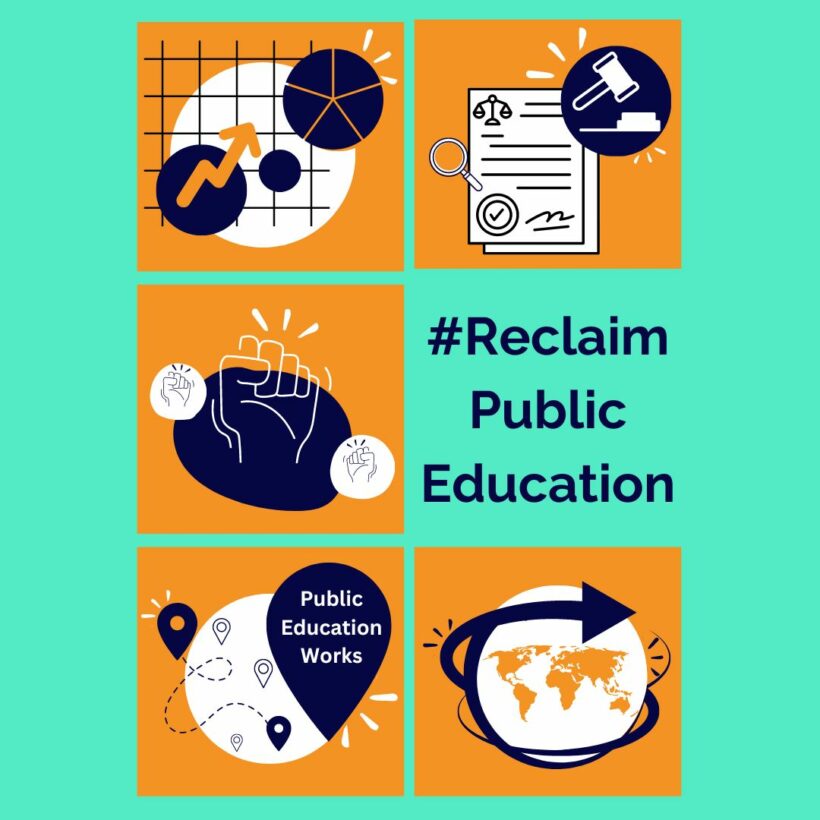In a world facing social fragmentation, harmful inequities, and environmental deterioration, we need quality, transformative, inclusive public education now more than ever. As our political systems struggle to resist autocracy and to foster democracy, free public education can help create a well-informed public with the capacity to address these global challenges.
The public supports public education, and public education works.
Free, quality, inclusive, public education is a human right. Over recent decades, the global community has undertaken the unprecedented endeavour of providing public education to the world’s two billion learners, and creating large-scale, adaptive systems of learning. The State is the duty bearer for public education, obligated to realise the right to education for all learners. This requires States to fulfil and expand their central role.
Only States have the capacity to address the current enormous educational inequities across gender, race/ethnicity/origin, social class, disability, and many other forms of exclusion. Moreover, the conception of “quality” in education must extend beyond workforce creation and attaining narrow learning metrics. Education technology must not displace teachers and depersonalise learning, nor supplant free, quality, public education provided in school settings. Instead, quality education must address broader human rights objectives, including the full development of the human personality, and foster skills for learners to meet today’s global challenges as informed and active citizens.
The project of ensuring universal and equal education opportunity is at risk due to the rising role of private actors in education. Extensive evidence across countries shows that privatisation of and in education does not improve quality and access, but diminishes education equity, in contravention of human rights law, U.N. Sustainable Development Goal 4, and often, national legislation. The logic of education privatisation and commodification includes specific elements (standardisation, profitability, autonomy, and deregulation) that result in the exclusion and segregation of certain learners, including persons with disabilities. We oppose education privatisation because it runs counter to the vision of equality, not only for low-income and marginalised communities, but for everyone, impeding social cohesion.
Public education suffers from egregious underfunding. UNESCO estimated an annual financing gap of almost $100 billion in education in 2023. Funding shortfalls stem from tax injustice, aid conditionalities, austerity, and other issues described as “50 Years of Failure,” marking a half century of using neoliberal economic policies in and through international aid. We call for international finance institutions to shift away from austerity and debt, and instead deliver equitable investment in education. At the same time, we oppose diverting scarce public resources to support private actors through entry into public-private partnerships. International finance institutions must not fund K-12 private schools.
Over the past decade, members of the Privatisation in Education and Human Rights Consortium (PEHRC) have worked together to advance the understanding and implementation of the human right to free, inclusive, quality public education, oppose the privatisation of education, and hold governments and institutions to account for their obligations to realise the right to education. As a group of civil society organisations, the Consortium refutes the vision of education as an individual good within inequitable systems where learners born into wealthy families benefit at the expense of learners born into low income families, and where education providers reap considerable profits to the detriment of universal, high quality education for all learners.
Instead, we, the undersigned, call on States to realise the human right to free, inclusive quality public education for all learners, throughout life. We believe that the future of human society depends on our collective commitment to public education. We, the undersigned organisations, movements, and individuals, call on everyone, especially States, to protect against private actors supplanting the public interest and to fulfil the human right to quality, publicly well-funded, free public education.
Specifically, we call for action in five key areas:
1. Prioritise the public. We call on all education actors to prioritise the provision of quality, public, inclusive, free education for all. As described in the Our Future is Public manifesto, we call on States to prioritise the public sector in general.
2. Robustly fund public education. Governments should achieve the minimum benchmark recommended during the Transforming Education Summit of allocating 6% of GDP and 20% of public expenditure to education to realise the right to education and teachers’ labour rights and well-being—as well as taking national and global action on tax, debt, and austerity as recommended in the TES Call to Action on Financing.
3. Stop funding education privatisation. States, development finance institutions, investors, funders, and intermediaries should ensure their funding does not support private, particularly, commercial/for-profit education. Such programs often exacerbate segregation and discrimination, erode free education, dilute curricula, fail to meet minimum quality standards, and reduce democratic oversight. Public funds should exclusively fund public education.
4. Regulate and enforce regulations on private actors. States must regulate private actors, in particular to avoid conflicts of interest by private actors shaping regulatory processes that govern their activities. States must invest in enforcing laws already in existence and develop new, strong regulation to protect the right to education.
5. A narrative change. Despite well-funded public relations campaigns claiming that education privatisation solves problems that the State cannot fix, evidence shows otherwise. We call for a change in the narrative that instead highlights the successes of public education. Public education works when it receives suitable support from States. The public supports public education across the world.
Please sign the statement and join us in the process of advocating for States to realise the full potential of public education. Our future depends on it!










